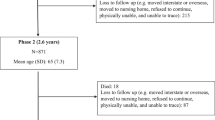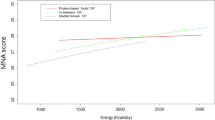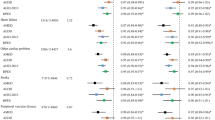Abstract
Objective: The investigation involves comparison of dietary behaviour between UK and Mediterranean France by characterizing the pattern of the current French Mediterranean diet compared with the current British diet.
Design: The findings of two dietary surveys, one in the UK and one in France, are compared. An interviewer-administered questionnaire was used in both countries. Questions on food frequency were used to assess dietary behaviour, which were regrouped in the French survey to correspond with UK groupings. Dietary indices were constructed to describe dietary behaviour in relation to cancer recommendations for intake of fat, fibre, meat, fruit and vegetables.
Setting: The UK study was conducted in Leicestershire, central England and the French study was carried out in Hérault, southern France.
Subjects: UK: n=418 subjects (57.9% female and 42.1% male; mean age=45.0 y); France: n=635 subjects (50.1% female and 40.9% male; mean age=49.8 y). Age range of both samples: 20–74 y.
Results: There were positive and negative trends in food consumption in each country. UK respondents reported eating more beans and pulses (P=0.000), less cheese (P=0.000), red meat (P=0.001), and processed meats (P=0.000) than French respondents. However, on the negative side, they ate less fruit and vegetables (P=0.000), fish and poultry (P=0.000), cereals (P=0.000), and more sweets and chocolates (P=0.000), and cakes, pastries, biscuits and puddings (P=0.000). Women had healthier diets in both countries.
Conclusions: Overall the southern French diet was healthier as French respondents scored significantly better for indices for fat, dietary fibre, fruit and vegetables (P=0.000 in all cases). However, the French sample scored poorer for the meat index (P=0.000).
Sponsorship: This study was supported by a grant from l’Association de la Recherche contre le Cancer (ARC) awarded to M Holdsworth.
European Journal of Clinical Nutrition (2000) 54, 530–539
This is a preview of subscription content, access via your institution
Access options
Subscribe to this journal
Receive 12 print issues and online access
$259.00 per year
only $21.58 per issue
Buy this article
- Purchase on Springer Link
- Instant access to full article PDF
Prices may be subject to local taxes which are calculated during checkout
Similar content being viewed by others
Author information
Authors and Affiliations
Contributions
Guarantor: M Holdsworth.
Contributors: MH re-organized both data sets for comparison and carried out the statistical analyses for the comparative study. MH prepared the paper, which all investigators edited. MG supervised both the comparative study and the French study, initiating and designing the French study. CH and AB designed the UK study protocol and supervised data collection and analysis. MHA collected the data for the French study and JS compiled the database. ES collected the data for the UK study and compiled the database.
Rights and permissions
About this article
Cite this article
Holdsworth, M., Gerber, M., Haslam, C. et al. A comparison of dietary behaviour in Central England and a French Mediterranean region. Eur J Clin Nutr 54, 530–539 (2000). https://doi.org/10.1038/sj.ejcn.1601048
Received:
Revised:
Accepted:
Published:
Issue Date:
DOI: https://doi.org/10.1038/sj.ejcn.1601048
Keywords
This article is cited by
-
US and France adult fruit and vegetable consumption patterns: an international comparison
European Journal of Clinical Nutrition (2009)



